|
|
|
Sort Order |
|
|
|
Items / Page
|
|
|
|
|
|
|
| Srl | Item |
| 1 |
ID:
111585
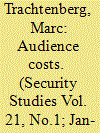

|
|
|
|
|
| Publication |
2012.
|
| Summary/Abstract |
This article examines the argument that the ability of a government to generate "audience costs"-to create a situation, that is, in which it would pay a domestic political price for backing down-plays a key role in determining how international crises run their course. It does this by looking at a dozen great power crises to see how well various aspects of the audience costs argument hold up in the light of the historical evidence. The audience costs mechanism, it turns out, does not play a major role in any of those crises-a conclusion which, the author claims, has certain important methodological implications.
|
|
|
|
|
|
|
|
|
|
|
|
|
|
|
|
| 2 |
ID:
144798
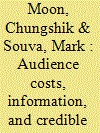

|
|
|
|
|
| Summary/Abstract |
Leaders who can accumulate audience costs can send costly signals that may help alleviate information problems associated with crisis escalation. We argue that research examining the effect of audience costs fails to appreciate the theoretical context in which audience costs matter. Audience costs may help alleviate information problems associated with international conflict. However, credible commitment problems are more central than information problems for some international conflicts. Theory does not expect audience costs to matter in this context; as a result, extant tests, and many criticisms, of the effect of audience costs on crisis escalation are flawed. We offer a more appropriate test of the effect of audience costs on crisis escalation. Consistent with extant theoretical arguments, we find that audience costs only reduce the likelihood of conflict when credible commitment problems are not the dominant concern motivating a dispute or crisis.
|
|
|
|
|
|
|
|
|
|
|
|
|
|
|
|
| 3 |
ID:
148546
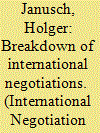

|
|
|
|
|
| Summary/Abstract |
This article examines whether the two-level game can theoretically explain negotiation breakdowns without referring to uncertainty alone. For this purpose, social conflicts are integrated in the two-level game. In this light, the classical hypothesis that smaller win-sets increase the risk of a negotiation breakdown can no longer be maintained. Instead, conflict intensity – and thereby the risk of breakdown – correlates with the intersection of the win-sets in the form of an inverted U-curve. It follows that negotiations are most likely to break down when the intersection of the win-sets is perceived as medium-sized, because the bargaining space and thereby the potential of conflict intensity is largest/highest. Furthermore, the insertion of social conflicts into the equation runs counter to the hypothesis that issue linkages facilitate international cooperation. On the contrary, issue linkages increase the risk that goal conflicts, in particular, intensify each other by spreading from one issue to another.
|
|
|
|
|
|
|
|
|
|
|
|
|
|
|
|
| 4 |
ID:
158284
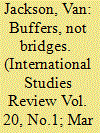

|
|
|
|
|
| Summary/Abstract |
Why might bilateral antagonism prove resilient to incentives for improvement from multilateral cooperation with shared third parties? Prominent theories predict that two actors with a record of cooperation in multilateral contexts would cooperate bilaterally as well; multilateralism is generally thought harder than bilateralism and provides opportunities for exposure and socialization that can facilitate preference convergence. This article presents Japan–South Korea relations as a deviant case for such expectations in the cooperation literature. Rather than think of multilateral cooperative contexts as “bridges” that facilitate closer, positive relations between actors, this case shows that multilateralism can instead be a “buffer” between two actors with negatively valenced ties, mediating bilateral friction sufficient to facilitate functional cooperation while insulating antagonistic national discourses or bilateral policies from pressures for change. In the case of Japan–South Korea relations, a pattern of simultaneous cooperation (with shared third parties) and friction (in bilateral interactions) over the same period illustrates a potential buffering logic of multilateralism; the multiparty context diffuses accountability for cooperative behavior that might otherwise generate domestic audience costs and allows policy elites to frame cooperation in a way that downplays or ignores the other.
|
|
|
|
|
|
|
|
|
|
|
|
|
|
|
|
| 5 |
ID:
165875
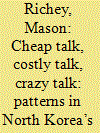

|
|
|
|
|
| Summary/Abstract |
This article examines the patterns in the Democratic People’s Republic of Korea’s (North Korea’s) use of hostile rhetoric in its internationally-directed messaging. The article first places North Korea’s belligerent rhetoric in the context of that country’s capacity to threaten the US and its Northeast Asian allies; indeed many analysts worry that Pyongyang’s rhetoric represents a conflict escalation risk or even a casus belli. Following this, the article discusses the common explanations – irrationality/incompetence, lack of audience costs, inter alia – for why the North Korean regime employs such hostile rhetoric, and finds these explanations wrong or misleading. The main analysis section describes the results of a study of 10 years of English-language propaganda published by the KCNA (North Korea’s state news agency). A multiple regression model is used to test the relationship between North Korea’s hostile rhetoric and a set of independent variables. The statistical tests indicate a mixed correlation of North Korean rhetoric to the independent variables. One major finding is that there is no correlation between hostile North Korean rhetoric and the country’s kinetic provocations. The conclusion discusses the role that North Korea’s rhetoric plays within the country’s larger adversarial relationship to the US, South Korea, and Japan.
|
|
|
|
|
|
|
|
|
|
|
|
|
|
|
|
| 6 |
ID:
116178
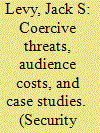

|
|
|
| 7 |
ID:
173897
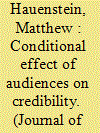

|
|
|
|
|
| Summary/Abstract |
How do leaders signal their intentions during a crisis? Scholars point to audience costs, potential political punishment for bluffing during bargaining, to explain how accountable leaders communicate. However, the empirical support for audience costs is mixed. I argue that this apparent disconnect between theory and evidence is due to different ways that audiences can threaten to use their sanctioning power during a crisis. When determining whether to punish a leader for a failed coercive threat, their domestic supporters should balance concerns over consistency and policy outcomes. As such, accountable leaders’ ability to credibly communicate is not automatic, rather it depends on their supporters’ policy preferences. I apply this insight using casualty sensitivity as a conditioning policy preference. I expect, and find, that audiences only help a leader commit to fight when fighting is low-cost, and actually prevent commitment when fighting is high-cost. Using compellent threat data, I find that audiences have countervailing effects on credibility due to their preferences for leaders who are both consistent and avoid costly conflict. This conditional effect could explain prior mixed support for audience costs in observational data, as prior studies pool together instances where I find audiences have strong, but opposing, effects.
|
|
|
|
|
|
|
|
|
|
|
|
|
|
|
|
| 8 |
ID:
175820


|
|
|
|
|
| Summary/Abstract |
As more women attain executive office, it is important to understand how gender dynamics affect international politics. Toward this end, we present the first evidence that gender stereotypes affect leaders’ abilities to generate audience costs. Using survey experiments, we show that female leaders have political incentives to combat gender stereotypes that women are weak by acting “tough” during international military crises. Most prominently, we find evidence that female leaders, and male leaders facing female opponents, pay greater inconsistency costs for backing down from threats than male leaders do against fellow men. These findings point to particular advantages and disadvantages women have in international crises. Namely, female leaders are better able to tie hands—an efficient mechanism for establishing credibility in crises. However, this bargaining advantage means female leaders will also have a harder time backing down from threats. Our findings have critical implications for debates over the effects of greater gender equality in executive offices worldwide.
|
|
|
|
|
|
|
|
|
|
|
|
|
|
|
|
| 9 |
ID:
119955
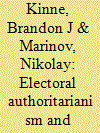

|
|
|
|
|
| Publication |
2013.
|
| Summary/Abstract |
How, if at all, do nondemocratic elections affect credible signaling in international crises? While the literature on credible signaling emphasizes the importance of electoral competition, it does not specify the minimal conditions that elections must satisfy in order to enhance the credibility of threats. We address this oversight by focusing on two fundamental properties of electoral institutions: (1) the degree of proincumbent bias and (2) the vulnerability of the incumbent to a de facto loss of power following an opposition victory. Our theory argues that both decreases in electoral bias and increases in incumbent vulnerability introduce greater accountability into the electoral process and thus enhance the credibility of public threats, even when elections fail to meet basic democratic standards. We apply these insights to the case of electoral authoritarianism, that is, regimes in which some form of electoral competition exists but basic principles of democratic governance are commonly violated. Using data on reciprocation rates in militarized crises, We show that, so long as electoral biases are sufficiently low and incumbent vulnerability is sufficiently high, even electoral authoritarian regimes are able to credibly signal resolve.
|
|
|
|
|
|
|
|
|
|
|
|
|
|
|
|
| 10 |
ID:
115201
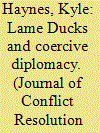

|
|
|
|
|
| Publication |
2012.
|
| Summary/Abstract |
The literature on "audience costs" in International Relations suggests that a democratic leader's electoral accountability lends him or her a significant advantage in crisis-bargaining situations. But if elections are the primary source of a democratic leader's accountability, a democracy's advantage in crisis situations should disappear when its leader is no longer eligible for reelection. Accordingly, this article asks whether "lame-duck" presidents, those who are constitutionally prohibited from reelection, are systematically less effective than their reelectable counterparts in crisis-bargaining situations. Using a data set of all post-World War II militarized interstate disputes initiated by presidential democracies, the author tests several hypotheses regarding lame-duck crisis behavior derived from Fearon's bargaining model. The findings generally support the audience costs model. Observed patterns of threat reciprocation and crisis hostility are consistent with Fearon's predictions. Crisis outcomes, however, do not appear to be affected by a democratic leader's lame-duck status.
|
|
|
|
|
|
|
|
|
|
|
|
|
|
|
|
| 11 |
ID:
125134
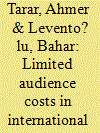

|
|
|
|
|
| Publication |
2013.
|
| Summary/Abstract |
Do audience costs have to be extremely large in order to credibly signal resolve and affect international crises? Existing theoretical work on audience costs suggests an affirmative answer, and recent empirical work on audience costs focuses on whether a leader can generate such large audience costs as to create a commitment to fight where no such commitment previously existed. We analyze a richer crisis bargaining model with audience costs and find that (1) audience costs can have war-reducing effects on incomplete-information crisis bargaining through a noninformative, bargaining-leverage mechanism and (2) audience costs can have war-reducing effects even when such large audience costs are not being generated as to create a commitment to fight where no such commitment previously existed. Even more limited audience costs can have war-reducing effects in international crises. We discuss how the bargaining-leverage mechanism is consistent with a number of prominent historical cases
|
|
|
|
|
|
|
|
|
|
|
|
|
|
|
|
| 12 |
ID:
172606
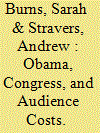

|
|
|
|
|
| Summary/Abstract |
SARAH BURNS and ANDREW STRAVERS analyze President Barack Obama’s decisions regarding Libya in 2011 and Syria in 2013 and 2014. Using statistical and case study evidence they argue that Obama’s request for congressional support in 2013 was an excuse to avoid action and audience costs rather than a genuine effort to gain congressional support for military action.
|
|
|
|
|
|
|
|
|
|
|
|
|
|
|
|
| 13 |
ID:
179372
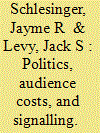

|
|
|
|
|
| Summary/Abstract |
Audience costs theory posits that domestic audiences punish political leaders who make foreign threats but fail to follow through, and that anticipation of audience costs gives more accountable leaders greater leverage in crisis bargaining. We argue, contrary to the theory, that leaders are often unaware of audience costs and their impact on crisis bargaining. We emphasise the role of domestic opposition in undermining a foreign threat, note that opposition can emerge from policy disagreements within the governing party as well as from partisan oppositions, and argue that the resulting costs differ from audience costs. We argue that a leader's experience of audience costs can trigger learning about audience costs dynamics and alter future behaviour. We demonstrate the plausibility of these arguments through a case study of the 1863–4 Schleswig-Holstein crisis. Prime Minister Palmerston's threat against German intervention in the Danish dispute triggered a major domestic debate, which undercut the credibility of the British threat and contributed to both the failure of deterrence and to subsequent British inaction. Parliament formally censured Palmerston, contributing to a learning-driven reorientation in British foreign policy.
|
|
|
|
|
|
|
|
|
|
|
|
|
|
|
|
| 14 |
ID:
179162
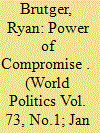

|
|
|
|
|
| Summary/Abstract |
In an era of increasingly public diplomacy, conventional wisdom assumes that leaders who compromise damage their reputations and lose the respect of their constituents, which undermines the prospects for international peace and cooperation. This article challenges this assumption and tests how leaders can negotiate compromises and avoid paying domestic approval and reputation costs. Drawing on theories of individuals’ core values, psychological processes, and partisanship, the author argues that leaders reduce or eliminate domestic public constraints by exercising proposal power and initiating compromises. Employing survey experiments to test how public approval and perceptions of reputation respond to leaders’ strategies across security and economic issues, the author finds attitudes toward compromise are conditioned by the ideology of the audience and leader, with audiences of liberals being more supportive of compromise. In the US case, this results in Republican presidents having greater leeway to negotiate compromises. The article’s contributions suggest that leaders who exercise proposal power have significant flexibility to negotiate compromise settlements in international bargaining.
|
|
|
|
|
|
|
|
|
|
|
|
|
|
|
|
| 15 |
ID:
057593
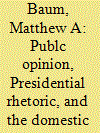

|
|
|
| 16 |
ID:
172846
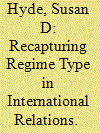

|
|
|
|
|
| Summary/Abstract |
A wave of recent research challenges the role of regime type in international relations. One striking takeaway is that democratic and autocratic leaders can often achieve similar levels of domestic constraint, which in many issue areas results in similar international outcomes—leading many to question traditional views of democracies as distinctive in their international relations. In this review essay, we use recent contributions in the field to build what we call a “malleable constraints” framework, in which all governments have an institutionally defined default level of domestic audience constraint that is generally higher in democracies, but leaders maintain some agency within these institutions and can strategically increase their exposure to or insulation from this constraint. Using this framework, we argue that regime type is still a crucial differentiator in international affairs even if, as recent studies suggest, democratic and autocratic leaders can sometimes be similarly constrained by domestic audiences and thus achieve similar international outcomes. This framework helps reconcile many competing claims in recent scholarship, including the puzzle of why autocracies do not strategically increase domestic audience constraint more often. Just because autocracies can engage audience constraints and democracies can escape them does not mean that they can do so with equal ease, frequency, or risk.
|
|
|
|
|
|
|
|
|
|
|
|
|
|
|
|
| 17 |
ID:
186900
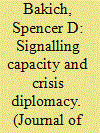

|
|
|
|
|
| Summary/Abstract |
In the 2017 U.S.-North Korea nuclear crisis, the Trump administration’s ‘maximum pressure’ strategy failed to achieve its objectives of the complete, irreversible, verifiable denuclearization (CVID) of the DPRK, and induced escalation pressures that brought the two countries to the brink of war. A deficit in signalling capacity (i.e. biased intelligence portfolio, lack of diplomatic-military integration, and inflexible military doctrine and war plans) prevented Washington from managing the crisis, creating the conditions for its strategic failure. The signalling capacity framework offers a comprehensive approach to explaining the outcome of the 2017 crisis, outperforming audience cost and brinkmanship theories.
|
|
|
|
|
|
|
|
|
|
|
|
|
|
|
|
| 18 |
ID:
116179
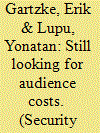

|
|
|
| 19 |
ID:
180223
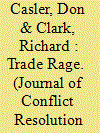

|
|
|
|
|
| Summary/Abstract |
Politicians frequently issue public threats to manipulate tariffs but only sometimes follow through. This behavior theoretically ought to generate audience costs. We therefore test the validity of audience costs in trade war settings through a vignette-based survey experiment. The vignettes describe a hypothetical situation involving the U.S. and a second country (China, Canada, or unspecified) with whom the U.S. has a trade deficit. The president (Democrat, Republican, or unspecified) either maintains the status quo, threatens to impose tariffs and backs down, or threatens to impose tariffs and follows through. Our findings highlight differences between security and trade conflict when it comes to audience costs and presidential approval. While Americans sanction the president for issuing a threat to raise tariffs, they generally support backing down. Regression modeling and text analysis of a free response question from our surveys suggest this is because consumers are wary of paying the costs of tariffs.
|
|
|
|
|
|
|
|
|
|
|
|
|
|
|
|
| 20 |
ID:
167283
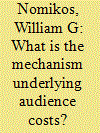

|
|
|
|
|
| Summary/Abstract |
Audience cost theory posits that concern over the nation’s reputation pushes voters to sanction leaders who make empty threats because they tarnish the nation’s honor. We question the empirical support for that theory. We show that survey vignettes in the previous experimental literature conflate audience costs generated by inconsistency and belligerence with approval losses arising from the perception that the leader is incompetent. These ‘incompetence costs’ are due to leaders not achieving audiences’ preferred outcomes. Our article contributes to the literature on audience costs by disentangling inconsistency and belligerence costs from incompetence costs, which we find are the larger component of audience costs. We also make a methodological contribution: we show that experimental designs in previous studies cannot test the different mechanisms; that previous estimates of audience costs are biased because treatments affect respondents’ beliefs about the likely outcome of policy actions; and we suggest a new experimental framework to estimate audience costs. Our results are consistent with arguments that audiences care more about policy outcomes than about leaders’ inconsistency or belligerence during a crisis.
|
|
|
|
|
|
|
|
|
|
|
|
|
|
|
|
|
|
|
|
|